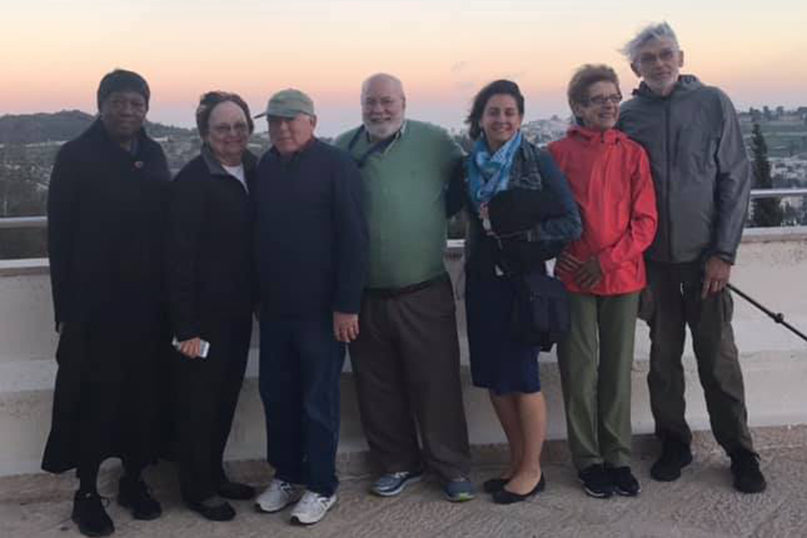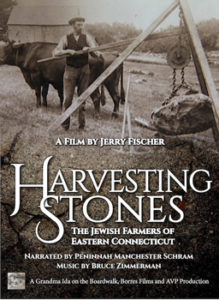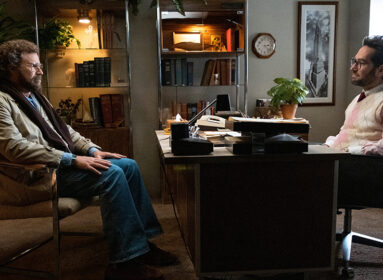
By Stacey Dresner
NEW LONDON – When Jerry Fischer decided to retire after nearly 35 years as executive director of the Jewish Federation of Eastern Connecticut, his retirement was tentative.
He told his board that he would like to work until June 30, but would work until Dec. 31 if they hadn’t found a successor.
“I wanted them to not feel like there was a deadline, but I also wanted them to not feel like if they found somebody good, I wouldn’t leave,” Fischer laughs.
The search team found his successor in Carin Savel, former executive director of the Jewish Federation in Raleigh, North Carolina.
Fischer’s last day as Federation executive director will be June 30. By Memorial Day he was done packing up his office in the historic Victorian house that has been the Federation’s headquarters for many years. (Before that it was the home of Cantor Samuel E. Manchester, the first Jewish spiritual leader in the New London area. Manchester’s daughter, Jewish storyteller Penninah Schram, grew up in the house.)
Since Savel arrived in New London in early May, Fischer has been orienting her to the organization or “on-boarding” as Fischer refers to the process.
“I needed to slow down and this job is not for somebody who is going to slow down, it’s for somebody who’s going to run fast,” Fischer explaines. “Carin has experience and energy.”
For years Fischer ran the Federation as a job but also a labor of love – of the Jewish community and of Zionism.
Growing up in Washington Heights, New York with a “traditional Conservative Jewish upbringing,” Jerome Fischer inherited a love of Zionism.
“My three uncles were very involved in socialist Zionism and my mother was also involved the Zionist youth movement. My grandmother was in Workmen’s Circle,” he says.
Fischer’s paternal grandfather, Rev. Judah Fischer, was an Orthodox rabbi and one of the founders of the Jewish Home for the Aged in New Haven.
“So I had the traditional religious on my father’s side and the social Zionist on my mother’s side,” he says.
After his bar mitzvah he joined Hashomer Hatzair, a Zionist youth group, and at that time he also became enamored of the kibbutzim in Israel.
His first trip to Israel was in 1966-67 on a yearlong program of the Jewish Agency called Institute for Youth Leaders from Abroad. He spent the first half of the year in Jerusalem and the rest on a kibbutz.
“It was a great year,” he recalls. “I was in love with the idea of the kibbutzim beforehand but then, living on a kibbutz and working on a kibbutz… I loved the sense of community. I loved the egalitarianism. And – this might sound funny – I loved kind of living on a farm. I grew up in the city and there, I was surrounded by open fields. It was just vibrant.”
Fischer thought about making aliyah, but after returning to the U.S. he entered City College in New York to study music and education. He got his masters at Hunter College in ethno-musicology – “kind of a combination of music and anthropology” and later became a graduate student and teaching fellow in music and ritual at Harvard University.
During the summers while working in Boston, he worked at Camp Grossman, the day camp for the Jewish Community Centers of Brookline, Boston and Newton. It was there that he began to think about a career in the Jewish communal world.
After stints at the San Francisco Jewish Community Center’s overnight camp and the Syracuse Jewish Community Center, he got the job as executive director of the Jewish Federation in New London.
When Fischer arrived in Eastern Connecticut in November 1984, “it was just me and a secretary,” he says. “Our first office was on State Street in a remodeled bathroom. We were literally in a room that used to be a bathroom.”
At that time, the Federation only covered the New London area, which at the time, according to Fischer, had “maybe 2,000 Jews.”
Over the years, the Federation added the towns of Norwich, Colchester, Willimantic and Danielson and it truly became a Federation of Eastern Connecticut.
In 2001, Pfizer Inc. opened a research center in New London, bringing more than 1,000 jobs. The company famously abandoned the city in 2009, after a controversial development plan that failed and Pfizer took its jobs with it.
“Things are challenging now,” he acknowledges. “There are opportunities, but the retrenchment of Pfizer hurt a lot.
“The growth of Electric Boat (which is now located in Pfizer’s former location) has helped the general community but not the Jewish community the way Pfizer did. Even before that we had a place called the Naval Underwater Warfare Center… a joint effort between Columbia and Harvard to develop solar systems. The center was here in New London so it brought a lot of Jewish academics here. We had Jewish physicists and Jewish electro-physicists. We had a brain trust here, a lot of which was Jewish and that moved away too.”
At one time, enrollment at the Solomon Schechter Academy, New London’s Jewish day school was at 98. Next year, Fischer says, there may be seven students.
On a positive note, Fischer said that he considers his two greatest accomplishments during his tenure to be the Federation’s resettlement of more than 350 Russian refugees during the ‘80s and ‘90s, and the founding of the Strochlitz Holocaust Resource Center.
 In 2016, Fischer debuted the documentary “Harvesting Stones: The Jewish Farmers of Eastern Connecticut,” which he produced, co-wrote and co-directed. The films shares the story of Jewish refugees, who beginning in the 1880s and even after the Holocaust, came to towns in Eastern Connecticut to become egg farmers, aided by the Baron de Hirsch society.
In 2016, Fischer debuted the documentary “Harvesting Stones: The Jewish Farmers of Eastern Connecticut,” which he produced, co-wrote and co-directed. The films shares the story of Jewish refugees, who beginning in the 1880s and even after the Holocaust, came to towns in Eastern Connecticut to become egg farmers, aided by the Baron de Hirsch society.
Fischer has also led more than 30 missions to Israel, something he still plans to do in his retirement.
“We have been the most successful Federation for missions in the entire state,” he proudly notes. “It goes back to why I love this community. It’s a very Zionist community.”
Mimi Perl has been Fischer’s administrative assistant for 28 years and editor of the Federation’s newspaper, The Jewish Leader.
“We’ve become more than boss-employee over the years. We have worked so closely together,” she says. “He is very passionate about it and he extends that passionate vision to us in the office. He has done everything with a good heart and has always wanted the best for this community.”
As for life after retirement, Fischer plans to see more of his grandchildren, who live in New York City, to visit his son in California, and to travel with his wife, Christine. But he won’t slow down completely.
“I will be working with Givat Haviva, an Arab-Jewish institute for shared society in Israel,” he says. “I’m very active in Arab-Jewish relations in Israel. I’m also active in ecology and nature preservation in Israel.”
He also plans to do some consulting work for Neot Kedumim, a Biblical landscape reserve in Israel.
He and his wife recently moved from New London to Waterford. But he will be around if he is needed.
“I love this community. I’ll still be involved, but it’s going to be Carin’s Federation now. I’m very confident about handing it over to her and very happy to do that.”
CAP: As he does every year, in March 2019 Jerry Fischer (center) led a Federation sponsored community mission to Israel.








 Southern New England Jewish Ledger
Southern New England Jewish Ledger












